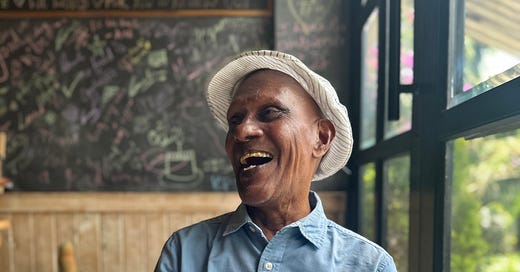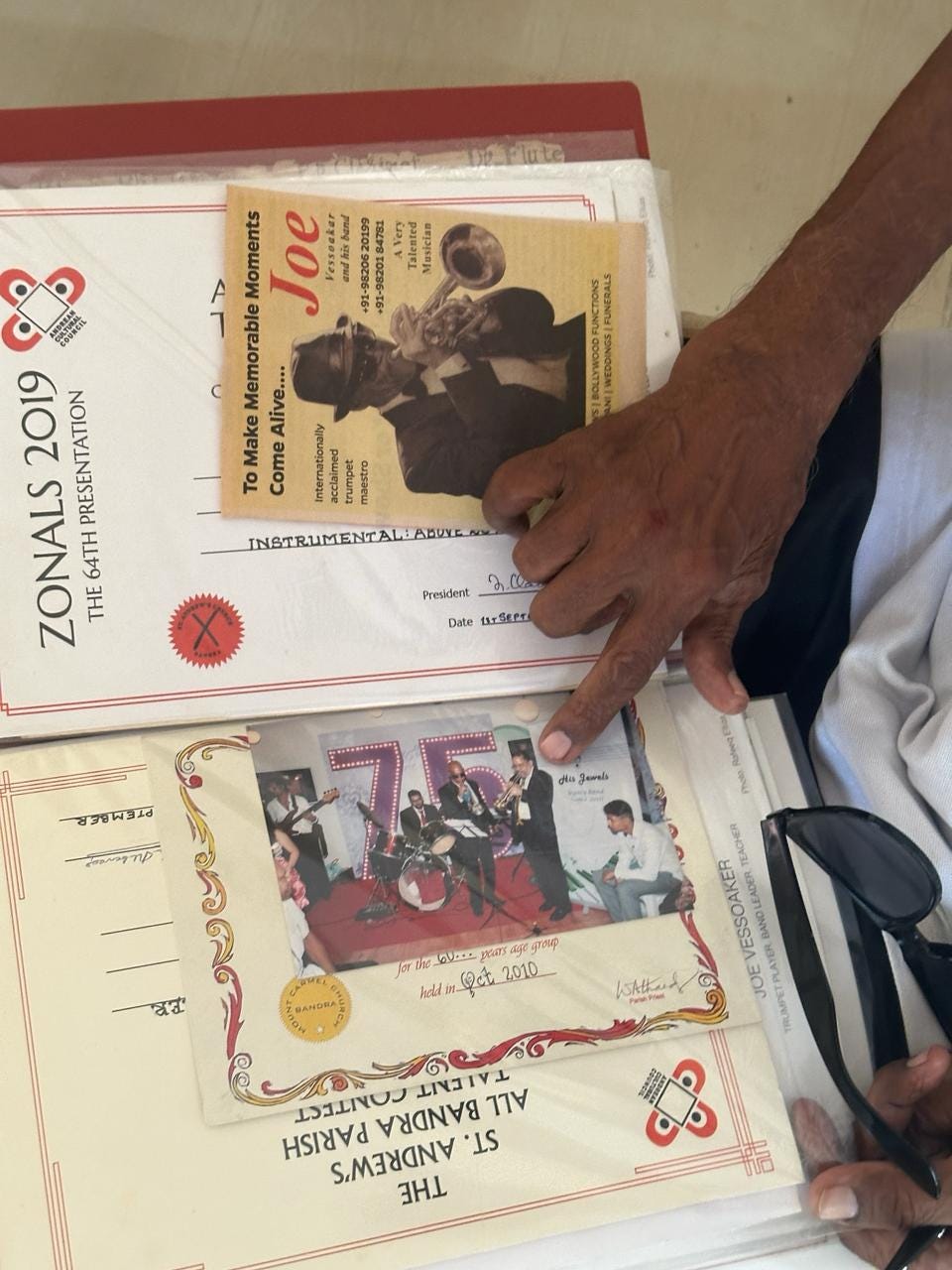The Memory Keepers Of Bandra is a project that documents oral history of the senior generation who live or have lived in Bandra, Mumbai. Through their lived experiences, it pieces together history, geography, culture and community. I intend to record and document at least two people every month. Which means this newsletter goes to you, twice a month. I might do more stories, but for now, let me not be over ambitious!
This is Joe Vessaokar’s story. Joe is a musician who has lived in Bandra all his life. How long is that? You’ll discover the answer to this very soon. He’s played at weddings, funerals, dances, shows and most mornings you’ll find him practising and playing his trumpet, sitting on a scooter in Bandra’s narrow Bazaar Road. Bikes, autos, shopkeepers, school kids, harried parents, shoppers, everyone stops when they see this man playing, between the bhajiwala and the fruitwala.
This is the story of Joe’s life.
Joe’s eyes twinkle. I made the mistake of starting by asking him when he was born. I hate that question he tells me, and throws his head back and laughs.
I was born yesterday. The day was 26th of April, nineteen hundred and fifty!
Joe was born in the downstairs kitchen of the house that he still lives in, in Bandra’s Bazaar Road. He tells me what he was 11, one day his mother got angry at him and revealed “ Tu Yedas, Tu Ghara Mati Janamla” (You mad boy, you were born in this house).
( Joe talks about getting a solid tanning)
His father was a fisherman and and a musician. I ask Joe where his father fished.
“My dad went in the night. He used to cast his nets at Mahim Bridge. He had a small boat, and he’d take his net, and sometimes wait the whole night, depending on the tide. And my mother sold the fish at bazaar road market.
You know what a jhinga is? When my father caught excess fish, he would give it to every neighbour. I used to go, get the plate of jhinga and give it to them. I felt very happy. I would come back from school and the first thing I would do is run to the seashore. To catch crabs and shellfish. That was all I had in my mind. What fish I could get on land.”
(Joe talks about his mother and the fish ladies)
He is the 8th of 10 siblings. And when I ask about how life was, this is what he says.
(Joe - on celebrations and ghumat)
Music runs deep in the family. His father managed to raise ten children, because he played at wedding and funerals, and had music to supplement his income. His father’s father played with the famous St. Paul’s Band. In fact, the day I go to record Joe, I bump into his student, Gary Curzai. Gary comes from a family that has a rich musical history. His great grandfather Joseph Amara was the Band Master of the St Paul’s Band.
It was originally called the St. Peter’s band, and was started in 1890 by Rev. Father D’Mello, as a Military Band that was attached to St. Peter’s Church. (more on the history of St. Peter’s Band and how it became St. Paul’s band in another newsletter)
(A huge thank you to the Curzai family for giving me access to this picture)
I can sense where Joe gets his love for music, when I hear him talk about St. Paul’s Band.
“You know, my father was playing in that band, my eldest brother was playing in that band, my father's brothers were playing in that band. It was a big band, they had all kinds of instruments. The French horn, the trombone, the tuba, the trumpet, the sax, the clarinet. When we were born, we saw the musicians with our eyes. We heard them play, we heard their skill, how they were moving.”
In numerous conversations with Joe, Dalda tins come up. Large tin canisters, that were the first instrument/object many musicians like him learnt to play on.
And we all the boys in the night, we used to sit down with Dalda cans. And we had sticks and we were playing on Dalda cans. You know, we used to just sing and then bang. But we had a rhythm in us.
(Image credit: ebay. Dalda tins are vintage collectors item now!)
My youngest brother learned the trumpet. The one above him, learned the tenor sax. My father was a baritone. And his eldest son was the trumpeter. After that, the second eldest son was a saxophonist, clarinet player, and a tenor sax player.And then after him was my brother who was a clarinet player. That’s how I learnt.
I joined my fathers band at the age of 7, and started by playing drums for the funeral band. It was all classical pieces from London, and they were very strict. It was very hard to play. There were a lot of dynamics in that. Like if you started on a low note, you would end with a low note.
(Joe talking about the first band he played with)
Joe tells me how he then went on to join Len’s band. At that time there were only two sound systems in Bombay/Mumbai. And the person from Aloo Sound recommended Joe. He remembers being called for an interview, and the entire band was there. He was asked to play Freedom Comes, Freedom Goes, and they heard his tonality and pitch, and said we want you.
Joe also talks about the competition with other live bands at thet time. Seven Galaxies, Jonny Baptist, Hells Angels, Crimson Rage.
Finally Joe ended up talking the plunge and starting his own band. Aptly called The Street Players. He shows me a photo of his band. There’s a trombone player, a tenor sax player, two trumpet players, a drummer, a keyboard player, a male and female singer.
(The Vessaokar Brother’s funeral band)
I let my band be free. Don’t play what you want to listen to, but create your own. Make a mistake, but move ahead.
(Joe’s collection of clippings)
I take a break in conversation and ask Joe if he remembers prohibition. He grins that big Joe grin and says
I remember Prohibition. I remember prohibition why? Because of the cops. They used to parade on Bazaar Road. The police…that time they didnt have uniforms, they were in civil dress. Like Rane, Palande, all these names. They were terrors, looking at them was enough. You know, you could make out a cop, because they had a stern look, they would look at you with those eyes, and we used to run in the gallis. I used to go and hide and stand behind my mamma.
The smuggling that went on here. I knew what was smuggling, and how the signals were given. This was a sea route, so gold from Juhu by boats, then from Gorai. Then watches, Seiko watches. There was a smuggling joint at Bandstand, at St John Baptist road. That was the hub of the smugglers.
There was smuggling done of liquor. Country liquor. Which came in the tubes, big tubes of BEST buses. When that handboat used to arrive at that extreme end over there, (This was before the reclamation, when the bylanes of Bazaar Road led to the sea.) they used to burn the three matchsticks, to give the sign to the one’s who are going to lift up all the liquor, to come here and be ready. And then they used to give them the signal - we are ready here. They used to proceed with the boat coming here, then all the workers used to run to the boat, carry one one tube on their back. And that time the hiding place for the liquor was the gutters, the drainage, they used to open and put them inside.
( Prohibition and the aunty shops)
I also ask Joe about reclamation.
First he tells me how much the sea meant to them. Practising by the sea, the sound of the waves teaching them about rhythm, the four tides in a day, fishing, looking for prawns and crabs, the sea was their backyard.
( The perks of living by the sea)
We really felt you know we are missing our sea, our swimming, and then when these buildings came out, we were the poor fisherfolks over here. Our livelihoods are gone. Immediately after school, we were in the sea. We were getting shells, shilpis. Our parents didn’t have to bother about our food. If we were out of the house, they knew where we have gone. Then it was all gone.
And finally, I’m impertinent. I decide to ask Joe why he never got married, even the answer is pretty apparent. Joe is married to his trumpet, and his music. But here’s the answer, in his words.
(joe talking about his first love)
Here’s a video that gives you a feel of Joe’s music and memories.
Thank you for getting this far. No part of this writeup or the vidoes, can be reproduced or shared without permission. Also, thank you Kabir for filming this with me, and editing the larger video. Thanks Huzefa, for helping me as usual, and editing all the clips. Thanks to Brian and Aunty Crystal, for being so warm and being the first to be interviewed. I can’t wait to share your story. And finally thank you Joe :)
PS: You can get to meet Joe, and walk with him. He does a wonderful walk around Chapel Road, Bandra with Go Hallu Hallu, a slow walking tour company.
And since you lasted this long, I leave you Joe’s favourite song when he played with Len’s band. A song they used to sign off with.










Old is gold, inspiring story of Joe and well captured!